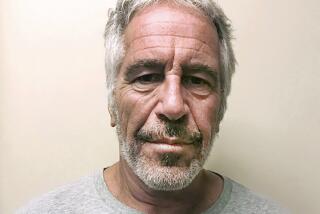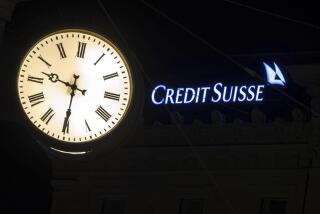Bringing the Swiss to account
For years, Swiss bankers have marketed themselves to the world’s super-rich as information black holes. Put your money in a Swiss bank account, they whisper, and you can hide it from your government’s tax collectors, to say nothing about a prying spouse, or ex-spouse, or inconvenient creditors. It’s a brilliant marketing tactic. Swiss banks don’t necessarily get better investment returns than banks in other countries, but they do offer one huge competitive advantage: the possibility of secret manipulation of money.
A settlement was announced Wednesday between the Swiss bank UBS, the Swiss government and the United States in the Internal Revenue Service’s lawsuit to learn the names of thousands of American tax cheats with secret accounts at UBS. But until the details of the pact are made public, we can’t know whether a real dent has been made in Swiss bank secrecy.
Selling bank secrecy has enabled Switzerland to move from an impoverished agricultural nation in the 19th century to a rich financial fortress in the 21st. But the world has paid -- and is paying -- an immense price for Switzerland’s success.
Why is it that so many countries, including the U.S., can’t collect taxes from large numbers of cheats? Why is it that petty tyrants can plunder their nations’ treasuries with impunity? Or that drug lords can launder their funds without fear of discovery? Or that terrorists can move funds around the world so easily? It’s because Swiss bankers -- and their clones in Lichtenstein and other banking black holes -- refuse to make information about secret accounts available to government investigators.
Of course, the Swiss deny it. They claim to be willing -- even eager -- to turn information over to foreign law enforcement officials as long as evidence of wrongdoing by a particular client is presented. But that’s the rub. Without access to the information in the bank’s records, it is usually impossible to find out whether wrongdoing is taking place. That’s the Catch-22 of Swiss bank secrecy. That’s why Congress finally required American banks and brokerage houses to report clients’ earnings to the IRS. Without such a system, we learned that huge numbers of taxpayers will ignore their legal duty to report the income.
Even after the IRS caught UBS red-handed selling secret Swiss accounts in the United States to hundreds of American tax cheats, UBS refused to provide the names of 52,000 other American depositors so that the IRS could ensure that they are reporting their earnings.
The Swiss government came to the bank’s defense. Switzerland told a federal judge in Miami, where the U.S. lawsuit was filed, that it would seize the information rather than allow UBS to comply with an IRS subpoena. The shabby drama that played out in a Miami federal courtroom made one thing clear: Swiss bankers cannot manufacture bank secrecy on their own. They need active cooperation from the Swiss government designed to stymie legitimate efforts by other governments to obtain information needed to enforce their laws. Some rogue states export terrorism or drugs; Switzerland exports a virus -- bank secrecy -- that eats away at the fabric of law in the rest of the world.
Bank secrecy is Switzerland’s most valuable national asset. Without it, Swiss banks would be forced to compete on a level playing field. Whenever Swiss bank secrecy is threatened, Switzerland buys off the challenger. When the European Union complained that tax evaders were using Swiss accounts to make a mockery of the income tax, the Swiss government agreed to have the banks make minimal lump-sum payments to European tax authorities rather than disclose the names of the depositors.
It’s a bargain-basement way to buy your way out of real tax compliance. When Holocaust survivors complained that Swiss bank secrecy made it impossible to find thousands of bank accounts of deceased victims, Swiss banks settled the case in 1998 for $1.25 billion rather than allow the victims to inspect their books.
The same scenario appears to be unfolding in Miami. The Swiss government has offered to have UBS maybe turn over a few thousand names when the known facts point to tax fraud, but it insists on preserving the general principle that Swiss banks are not obliged to turn over financial information to foreign government investigators in the absence of specific proof of wrongdoing. So far, the U.S. has talked tough, but the proof will be in the details of the settlement.
A huge amount is at stake. If Swiss bank secrecy can survive this debacle, the message to the tax cheats of the world will be clear: Swiss banks are open for business as usual. If, however, the IRS hangs tough, an equally important message will go out: Opening a Swiss bank account will no longer shield you from legitimate efforts by your government to obtain financial information needed to enforce the tax laws. It just might mean one less rogue state.
More to Read
Sign up for Essential California
The most important California stories and recommendations in your inbox every morning.
You may occasionally receive promotional content from the Los Angeles Times.










